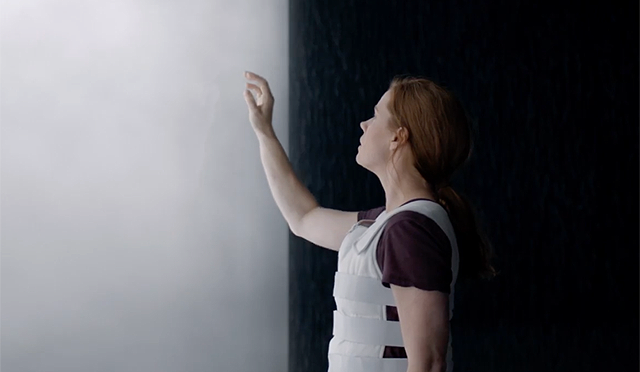Tuesday, 29 November 2016
Speaking in tongues: "Arrival"
Is there intelligent life out there? At this point in 2016, you could be forgiven for asking. Denis Villeneuve's Arrival hovers into view in that Pre-Christmas Semi-Sentient Sci-Fi slot occupied by Gravity and The Martian before it, intending to probe a little deeper than, say, the boom-bang-a-bang of this summer's Independence Day: Resurgence. Here is what's essentially a two-hour conversation between a woman and a couple of extraterrestrial hand-squid things, a dialogue initiated specifically to keep explosions and casualties at a minimum; and a mainstream multiplex project skewed towards jaw-jaw, not the usual war-war. How often do we find ourselves presented with a much-trumpeted, talking-point event movie in which the central figure, here seen working both with and against the might of the military machine, is a linguist - and a female linguist at that?
As Amy Adams' Dr. Louise Banks is summoned from academia to help establish the purpose of the alien craft hovering over her part of Montana (and elsewhere around the globe), Villeneuve again demonstrates his ability to put an audience right in the thick of things. Early on, a lovely, sinuous shot from the POV of the helicopter Banks is being choppered in on establishes both the presence of the crescent-shaped craft amid the Montana hills and, circling further around, the massing ranks of the US Army, gathered in equal parts anticipation and suspicion: a flourish that immediately sets the audience on notice as to the two forces in opposition within the film, and to Banks's status as an intergalactic go-between.
Already the director has underlined his status as a scholar of the multiplex sound system, with a scene in which the ringing of students' smartphones alerts our heroine to the notion something's amiss beyond campus; this supremely immersive use of sound - a feature of Villeneuve's previous Sicario - continues as Banks is zipped inside her hazmat suit before making her way out to the craft ahead of first contact; any remaining space on the soundtrack is swiftly filled by the crackle of walkie-talkies, round-the-clock news media chatter, and those online wind-up merchants insisting Earth should fire the opening shot, while Johann Johannsson's score drifts in and out like the fog off the surrounding mountains. What Villeneuve and screenwriter Eric Heisserer - adapting Ted Chiang's short story Story of Your Life - set us to consider is how any invading force could make itself heard in the modern era, and whether or not we Earthlings would be capable of listening.
That's an interesting angle for a contemporary SF movie to explore, and far more so than in the bombastic yet slightly hollow Sicario - that critical and commercial hit that presumably allowed Villeneuve a shot at a project this questing - this filmmaker's virtuosic technique has been wedded to knotty, fascinating ideas. Chief among these is how language works, and Heisserer has done an admirable job in breaking down this complex subject into something popcorn-munchers everywhere might engage with. The difference in how some men and women talk, for example, strikes us during an apparently throwaway anecdote that finds a grunt on the phone to his understandably concerned beloved: the sweetheart teary, emotional, imploring, her alpha swain bluffly neutral, pushing against her pleas with the firmest and straightest of bats. (Thus are Mars and Venus reconciled on Earth.) Villeneuve develops this idea in his blocking of key scenes: where the men - Forest Whitaker's Colonal Weber, Michael Stuhlbarg's CIA analyst et al. - forever stand resolute, arms across chests, in anticipation of hard, fast responses to their inquiries, Adams-as-Banks, her hands at her sides, remains open to nuance, ambiguity, debate, and QED to a future others would close off.
Which is not to say that Arrival is entirely convincing. Somewhere deep in its DNA, there are traces of those old Disney live-action ventures in which an idealistic young soul tries to make friends with the animal that's strayed into their backyard - and to keep said pet safe from those reactionary old coots reaching for their shotguns. (Here, in a nod to our new world order, those coots are China, Russia and Pakistan.) I found the merging of the emotional with the supernatural far less effective here than I did in Gravity: the film loses something when it shrugs off its philosophical mantle in the closing half-hour to reveal its true form - that of puzzle picture - and it becomes outright bathetic once the title's dual meaning is fully articulated. Where Spielberg (in Close Encounters) and Kubrick (in 2001) looked upwards and outwards going into their final acts, Villeneuve turns his gaze backwards and inwards - we're headed towards a close enounter of the most basic and heteronormative kind.
At the same time, though, you cannot deny those elements of intelligent, often elegant design assembled here: those hand-squids, for example, pumping their ink out into zero gravity so as to compose circular sentences in the sky, or the fact these particular alien crafts resemble the usual flat discs, only flipped up along the vertical axis, so that they come to look like satellite discs or - at a stretch - open ears. All Heisserer's final-reel softsoaping can't entirely overwrite a resonant idea that lingers in the mind and soul far longer than Gravity's bungee-cord gimcrackery or The Martian's practical science applications: language as a form of empathy, a reaching-out - which is why it may be more important than ever how we use it. Hello, my name is Mike, and for the sake of the world as it stands - and of the world as it might yet be for future generations - I recommend that you go see this movie.
Arrival is now playing in cinemas nationwide.
Subscribe to:
Post Comments (Atom)

No comments:
Post a Comment